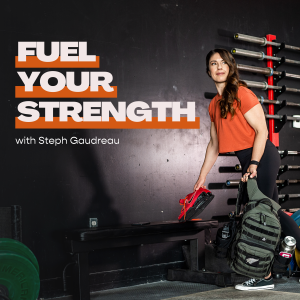
Cardiovascular Fitness & Training for Women w/ Dr. Alyssa Olenick (Part 2)
 2024-01-23
2024-01-23
In the world of fitness and nutrition, there is so much misinformation and oversimplification of concepts out there. This is why Dr. Alyssa Olenick is here to continue our conversation surrounding everything from heart rate zones to perceived excursion and how to balance your intensity properly.
Key TakeawaysIf You Want to Improve Your Cardiovascular Health, You Should:
-
Focus on getting fit and meeting the physical activity guidelines if you are just starting out
-
Don't get caught up in the all-or-nothing perfectionist mentality when it comes to your heart rate
-
Get over the idea that you have to annihilate yourself for fitness to count
Finding Balance with Dr. Alyssa Olenick
Dr. Alyssa Olenick, or Dr. Lyss, is currently a Postdoctoral research student studying metabolism and menopause. She has a Ph.D. in Exercise Physiology, where she researched metabolism and exercise science in females. Dr. Alyssa is on a mission to redefine evidence-based fitness. She is passionate about science-based nutrition and fitness and how the two integrate so that she can help people become their healthiest selves while chasing their boldest fitness goals.
Learning to Love Zone 2
Whether you are just starting out with your cardiovascular health journey or have been going for a while, there is a good chance the conversation surrounding Zone 2 has come up more than once. Dr. Lyss has a ton of experience in understanding and applying the nuance of research to everything from your heart rate, RPE, level of intensity, recovery, and so much more. Learning what to focus on and pay attention to at the different levels of your training will help alleviate your concerns about both strength training and cardiovascular fitness.
Training in a Different Way
Dr. Lyss wants to encourage you to think about your training program holistically. Balanced fitness training can help you develop characteristics for health, life, and longevity. However, this takes a different mental approach and view of what quality training and intensity are. It is not just about pushing yourself to your maximum; it is about looking holistically at your overall intensity to see where you can go harder because you have held back in other areas.
Female physiology needs both strength and cardiovascular health. A well-rounded training and athletic approach program can help you be the most resilient human you can be.
What is your relationship to cardiovascular training? Share your thoughts with me in the comments on the episode page.
In This Episode- Where to start when looking to improve your cardiovascular fitness (6:40)
- Understanding the role of heart rate and how to figure out where you need to be (20:58)
- How to assess your training distribution and fitness mindset throughout the week (31:27)
- What to do if you feel like you aren't working hard enough (36:04)
- Learn how to train in a recoverable way to ultimately do more (41:02)
“Do not worry about the mode or how you do it or how intense it is or the zone that you are in; the first thing you need to do is get to the physical activity guidelines.” (7:29)
“But you have to decide, once you have been doing this for a while, ‘what do I actually want from this?’.” (16:15)
“When you are doing more intense exercise, you are having to focus more on your steps and your breathing and what you are doing. So these are all things that I like to use for checking in with yourself.” (30:25)
“Not all training needs to be hard to be quality.” (36:43)
“Hybrid training is health. And it doesn't have to be running and lifting. It can be so many different things. But train multiple characteristics of your fitness.” (43:37)
Featured on the ShowApply for Strength Nutrition Unlocked Here
Doc Lyss Fitness
Follow Lyss on Instagram
Full Show Notes
Follow Steph on Facebook | Twitter | Instagram | YouTube | Pinterest
I'd really love it if you would take 1 min and leave us a rating and review on iTunes!
Podcast production & marketing support by the team at Counterweight Creative
Rate and review on Apple Podcasts
Related EpisodesFYS 420: Dr. Alyssa Olenick (Part 2)
More Episodes
 2024-10-15
2024-10-15
 2024-10-01
2024-10-01
 2024-09-17
2024-09-17
 2023-12-12
2023-12-12
 2023-11-28
2023-11-28
 2023-11-14
2023-11-14
 2023-10-31
2023-10-31
 2023-10-03
2023-10-03
Create your
podcast in
minutes
- Full-featured podcast site
- Unlimited storage and bandwidth
- Comprehensive podcast stats
- Distribute to Apple Podcasts, Spotify, and more
- Make money with your podcast
It is Free
- Privacy Policy
- Cookie Policy
- Terms of Use
- Consent Preferences
- Copyright © 2015-2024 Podbean.com




